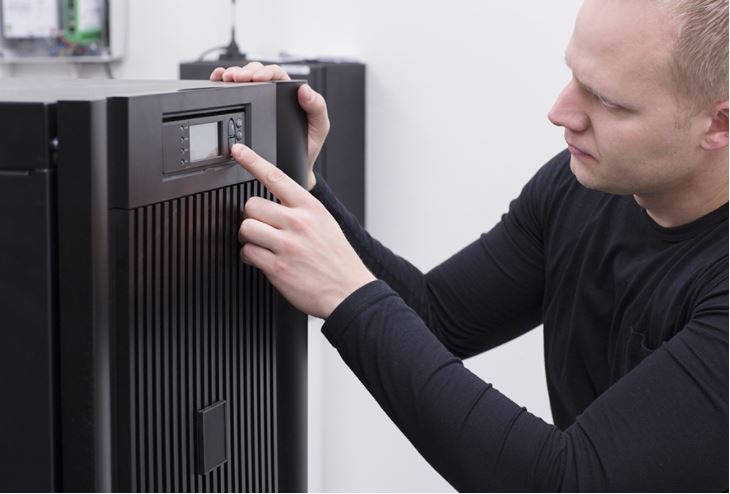Do you recognize that the battery backup mechanism of your system actually does work? Your uninterruptible power supply (UPS) may already be expired until you conduct routine checks and servicing.
Imagine a sudden power failure without a generator backup. Still, time is absolutely intolerable in any company due to power loss. When workers are unable to use facilities, telephones, or records, the resulting costs increase an hour.
Over and beyond the direct effects, non-compliance with legislative requirements, negative company opinions of the consumers, and even loss of customers may also occur.

Institutions build UPS systems in order to avoid expensive disruption and harm to their company, but the backups will fail if required without frequent inspection and maintenance from UPS battery load testing services. Here are the facts for all UPS battery-proofing testing and repair administrators, data center managers, and business leaders.
UPS system usage:
If commercial AC electricity unexpectedly goes out, DC batteries will be widely used in power plant and power appliances automatically. If the generator is accessible for your plant, the UPS system runs the DC facilities before the generator takes over. That being said, if no generator is installed, the batteries will operate the system before commercial AC is restored or battery capacity is depleted.
UPS battery testing:
In every UPS system, there’s also a timebomb. The batteries that operate the UPS units normally last three to 5 years. However when the time is right, and you need to operate these batteries – are you sure they’re working?
Daily testing is important for a UPS to optimize uptime and safeguard vital appliances’ power failures. Frequent monitoring helps detect problems, warn users to corrective measures, and avoid devastating interference of electricity.
Battery companies actually need a minimum of initial battery monitoring after implementation, not only for battery testing but also for the safety measures they need to be adequately installed.
Many UPS devices today will notify trouble technicians remotely. Advanced tech analysis will include voltage status and additional factors. But a physical examination of the battery systems is required which includes –
● Equipment condition; battery and isolation wear and corrosion tests
● Enclosure condition; is the zone clean?
● Thermal scan examination for hot spots found for all cable ties and device elements
● Stock and audit materials; manufacturer, construction, serial, and model numbers
● Trying to draw purification; front lifts, wires, diagrams, and floor plans
● Test other elements of the electric system, including transmission switches, interrupters and maintenance bypasses
UPS Battery Maintenance:
In addition to optimizing equipment life, the key aim is to optimize running time based on organizational needs in every preventive maintenance program. Regular battery maintenance helps installations to actually understand the condition of the batteries so that they work if necessary in case of commercial AC failure to supply backup power.
In parallel to the initial post-installation testing, suppliers of batteries often require periodic (at least) battery testing and battery guarantee claims reports. These records must include voltage monitoring, battery room average temperature, and precise gravity measurements (when batteries are flooded).
Often as part of a routine maintenance plan, batteries can also have to be substituted. Here are two examples of replacement of batteries in a UPS:
● Capacity hit
● At the conclusion of their service life
Close monitoring and servicing play a significant role in the control and operation of the device’s lifespan.
Some other ways to maintain your UPS:
● Identify points of failure –
Each year your facility will cost thousands of dollars of unnecessary energy in poorly built or operated electrical infrastructure. Therefore vital mission installations should be installed so as to hermetically seal walls, floors, doors, and ceilings.
A service vendor should also be a supplier of solutions, which recognize operating equipment ineffective, hazardous, or poor climatic conditions and give your facility and operation practical suggestions.
● Ensure generator functioning –
Like the vehicle, the engine of a generator relies on the battery that needs to be maintained to ensure the best possible output. Battery failure, again due to little or no maintenance and sometimes aging, is the most major condition of a generator power failure.
In addition, maintenance testing guarantees the correct scale, configuration, and servicing of the generator to assist the UPS, AC, and mission-critical facilities. Although this is not part of a UPS servicing examination, the infrastructure supporting the essential loads must be maintained by your facilities.
Final Words:
Regular battery tests allow members to recognize just how much the batteries generate energy if necessary, as well as provide insight into long-term financial planning and maintenance budgeting.
Every battery has a finite life and needs to be substituted at some stage, but you can schedule your intended replacement with regular testing.
UPS battery checks and repairs from UPS battery testing service are a vital step towards ensuring that the essential machinery is secured from power breakages during the facility’s regular maintenance program.
Write for us
Avadhesh Sharma is SEO expert and loves to write on various topics like technology, business, electricity, food and lifestyle environment.